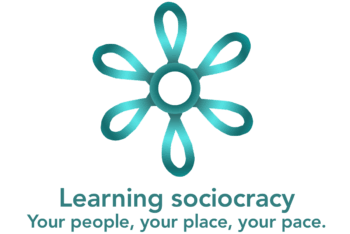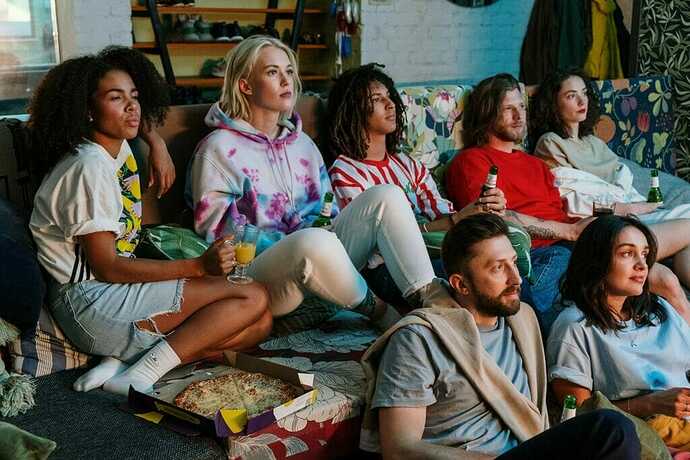Originally published at: Deep friendships using tools from self governance
Deep friendships are increasingly rare. We live in a culture that instead of valuing close relationships prioritizes performance in the workplace. Capitalism drives workplace culture and thrives by creating systems that isolate us. The result is many of us are not sure what a deep friendship looks or feels like anymore. What is best for a friendship will vary in each relationship. Self-governance offers us tools we can explore as we try to cultivate deeper relationships. Sociocracy, a type of self-governance system, is often used to enable small groups to work and make decisions together. Often throughout the process, whether you consider each other friends or colleagues, you grow closer. You can use the same tools to strengthen and build your relationships.
Build deep friendships on shared aims
Shared aims or projects are necessary for long-lasting, deep friendships. An aim, in sociocratic terms, is simply a goal that people agree to work towards together. A lot of frustration in friendships is caused by people wanting different things and working towards different aims. Once we identify that is happening, we can talk about it, and decide together what we want to share in our friendships.
I remember when I first moved to a new town, I was desperate to make friends. I joined a tabletop roleplaying group, excited to connect with the people there. Then, work started up. I found other things I wanted to do. I didn’t have the time or interest to engage with the roleplaying campaign to the extent the rest of the group expected of me. At some point, I realized I wasn’t able to contribute towards the aim of co-creating a fantastical story in a way that worked for other people. Also, I cared more about getting to connect with lots of people rather than the game itself. I talked about it with the group. After, I stayed friends with most of them, but changed the ways I spent time together with them. We chose activities that felt more satisfying for us with my unpredictable schedule.
Friendships can change too
Your friendships can change too and will be stronger if you can be honest about what you’re wanting. While it can be hard to do if you’ve never tried before, often people feel trusted and cared for, when you tell them you want to relate more closely. Working together, you can figure out how to have the time you spend together be more enjoyable for both of you. Spend some time connecting with what you’re wanting. It might help to do some journaling or brainstorm together. Be prepared to listen to what they want too. The overlap of your mutual desires is a great place to choose aims for your relationship from.
Below are some categories to consider when brainstorming what types of aims you might want in your relationship.
Types of Aims for friendships:
- Material– such as building projects or obtaining a physical resource together.
- Emotional– being able to openly share feelings, or engage in experiences that help you cultivate certain feelings.
- Physical– such as connecting through sports, dance, or other types of touch or physical experiences.
- Other– it’s your friendship! It can be based on whatever you want it to.
Deep friendships depend on consent and the ability to say no
The real power of an aim in sociocracy is that it gives you grounds upon which to object to a decision. Sociocracy uses consent decision making. A decision is only agreed to if everyone consents to it, which is measured by the lack of an objection. Objections in consent decision making are made on the basis of something holding us back from the aim. If you don’t know what your aim is, it might feel difficult to object.
There’s been times where I’ve found it difficult to say no. Often, I feel so lucky to be able to see my friends, even if we don’t have clear plans about what we want to do. Especially if we’re all feeling tired, it feels easier to go along with the first idea anyone suggests. We’re grasping for straws, someone mentions a movie they saw a post about on Facebook. They don’t actually sound excited to watch it. The rest of us seem equally indifferent.
Saying no in friendships
While in your place of work, it might be okay for you to consent to a proposal you feel indifferent about. However, the basis for friendships are often more emotional than places of work. Your aims are more likely to include cultivating certain types of feelings. Imagine you’ve identified a shared aim in your friendship of building closeness or having shared experiences of mutual joy. If you know that watching that movie together will not bring you either of those things, then it is your responsibility to object. Then, together, you can make a better proposal.
In my case, we talked about things we can do together when we’re low on energy. It inspired creating group support around self-care. We felt closer than we did half-passed out in front of a screen. And our bodies felt rejuvenated rather than drained.
In thinking about objections in this way, sociocracy can be a useful framework to empower us to say no in our relationships more often. This can be difficult to adjust to. Learning to trust that we still care about each other and our shared aims when we do say no will help us build a deeper and more satisfying friendship.
Group decision making allows deep friendships to include more people
Part of what holds us back from having more deep relationships in our lives is that it can often feel like it takes too much time, energy, or money. Group activities can help with this.
By letting you spend time with many people at once they are more time efficient. They can also be more cost-effective, as you can split costs or even qualify for group discounts. Even with these benefits, many people still dread the thought of planning a group activity. It’s hard to make decisions because it’s not clear who’s in charge. Or it is clear who is in charge, and it doesn’t feel like other people get a say in what ends up happening. There’s been times where I’ve tried to plan a trip together, and it’s hard. Everyone is unhappy because we all think someone else is in charge. Then, things don’t get done, and we’re confused. Using sociocracy, it’s easier to keep track of all the things that need to be done and who is doing them.
Form a Study Group
 Check out our self-paced video curriculum for study groups. Practice sociocracy on your own!
Check out our self-paced video curriculum for study groups. Practice sociocracy on your own!
How sociocracy can help you?
Sociocracy works best for groups of around 6-8 people, meaning you can actually make better use of it when planning group activities. Sociocracy is built around sharing power, making every voice heard, and making decisions together. Its meeting format and use of rounds lets everyone feel heard and have a say while also saving time. Its focus on group process and consent will make it easier to decide on something everyone can agree to. The plan you make together will usually be better than the plan anyone could make on their own.
This article can’t go in depth about the entirety of how to use these tools. Learning more about sociocracy could be a group activity you explore together. Consider taking the self-paced, video-instruction based Sociocracy Basics course together. You could also choose a free workshop on the events page.
Customizing your tool-kit for building friendships
Each friendship and group of friends will have its own dynamics. These tools can help build and maintain deep friendships. But, they might not all be suitable for each relationship. Use what works well for you, and think about taking these skills beyond your friendships. Explore collaborating with a larger community or organization. Together, we will be better positioned to change the systems that keep us so alone.

